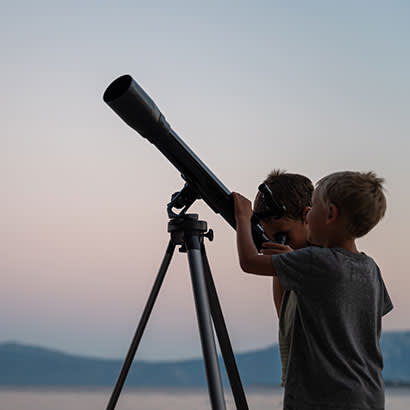
Pictured: Two youth look at stars through a telescope. Photo by Gajus, courtesy of Adobe Stock.
The youth are literally the future, and as parks and recreation professionals, it is not our sole responsibility to enrich them in the moment by providing fun water parks or the tallest playground in the state. We must bring about curiosity, encourage critical thinking and inspire them to be a part of the community, so that they may have the desire to maintain and improve it.
To do so, the youth must have an earthly viewpoint, a sense of global responsibility, and acknowledge humanity’s array of differences and similarities. This can be achieved by exposing them to programs or activities related to the following science subjects, according to Neil Postman in the book, The End of Education.
Archeology
The study of human history and prehistory through site excavation and the examination of artifacts and other tangible remnants is known as archeology. Archeology is a useful subject if we want to raise awareness of the value of Earth and its role as our home, both now and in the future. Below are activities park and recreation professionals can incorporate in their programming:
- Dig Activities
- Sandbox dig: Burry small objects in a sandbox and let kids carefully excavate them using brushes and small tools, documenting where they find each item.
- Mystery box: Fill a box with various items representing different time periods and have kids guess what era they belong to based on the objects.
- Artifact Analysis
- Pottery analysis: Break apart pieces of clay pottery and have kids put them back together.
- Show pictures of ancient artifacts and ask questions about what they might be used for, who might have made them and what they tell us about the people who lived then.
- Storytelling and Visuals
- Share stories about famous archaeological discoveries like King Tutt’s Tomb or Pompeii to capture their interest.
- Use pictures and videos to show real archaeological sites or take them on a field trip to a museum.
Astronomy
The scientific field of astronomy studies space, the physical cosmos and celestial objects. If we want to foster awe and interconnectedness, this is an important topic. The youth may come to see that ignorance and apathy pose a bigger threat to Earth than asteroids. Below are activities park and recreation professionals incorporate in their programming:
- Build a model: Create a scale model of the solar system using Styrofoam balls, string and a central sun.
- Constellation jars: Make a constellation jar with glitter and a clear container to represent star patterns.
- Stargazing: Find a dark spot to observe the night sky using a star chart to identify constellations, and incorporate a telescope, if possible.
- Storytelling and mythology: Share stories and myths related to constellations to make learning fun and engaging.
Anthropology
The study of human societies, cultures and their evolution is known as anthropology. Learning about difference makes us braver because it reduces our fear. We grow more optimistic when we discover similarities. Is there anything more important for our world than a brave and optimistic future? We must constantly stress in this subject the value of respecting different cultures, avoiding stereotypes and exercising ethical awareness by talking about how important it is to be mindful of cultural differences when learning about other people's customs. Below are activities park and recreation professionals can incorporate in their programming:
- Storytelling: Share engaging stories about different cultures, including folktales, myths and real-life experiences to illustrate cultural practices.
- Create a “cultural collage”: Have kids gather pictures representing various aspects of a culture (food, clothing, housing) and create a visual display
- Cultural craft day: Make traditional crafts from different regions like masks, instruments or decoration.
- Explore food and celebrations: Discuss traditional foods and festivals from different parts of the world, using taste testing where appropriate.
We cannot disregard the youth’s enthusiasm and capacity for idealism. These subjects must be continuously presented as the youth age, so they can ask more questions, propose solutions and foment innovation. I invite park and recreation departments all over, including my own, to explore this way of thinking.
Rebecca Ortiz is the athletics and rentals coordinator for City of Irving Parks and Recreation Department.


